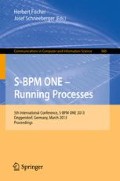Abstract
Traditional S-BPM successfully focuses on standardized business processes which are performed according to a fixed predefined process model. Yet a substantial share of business processes is difficult to predict with exceptions to the core processes occurring frequently.
This contribution proposes to explicitly consider exceptions and handle them according to their degree of standardized behavior. A methodology comprising three main components provides guidance for this new perspective on exceptions: (1) a classification details the types of exceptions that are encountered in real-world S-BPM projects. (2) An approach inspired by the exception handling mechanisms in software engineering advises methods and tools for handling the exception types and suggests a corresponding escalation mechanism. Both the classification and the procedure model are validated by ten domain experts. (3) The S-BPM notation is extended in order to effectively leverage the proposed approach.
Access this chapter
Tax calculation will be finalised at checkout
Purchases are for personal use only
Preview
Unable to display preview. Download preview PDF.
References
Antunes, P.: BPM and Exception Handling: Focus on Organizational Resilience. IEEE Transactions on Systems 41, 383–392 (2011)
Milliken, A.L.: Using Exception Management to Improve the Demand Forecast. The Journal of Business Forecasting 30, 4–12 (2011)
Saastamoinen, H.T., Markkanen, M.V., Savolainen, V.V.: Survey on exceptions in office information systems. University of Colorado at Boulder. Technical Report, CU-CS (1994)
Sadiq, S.W., Orlowska, M.E.: On capturing exceptions in workflow process models. In: Abramowicz, W., Orlowska, M. (eds.) BIS 2000, pp. 3–19. Springer, Great Britain (2000)
Casati, F., Ceri, S., Paraboschi, S., Pozzi, G.: Specification and Implementation of Exceptions in Workflow Management Systems. ACM Transactions on Database Systems 3, 405–451 (1999)
Saastamoinen, H.: Case study on exceptions. Information Technology & People 8, 48–78 (1995)
Eder, J., Liebhart, W.: The workflow activity model WAMO. In: Proceedings of the 3rd International Conference on Cooperative Information Systems (CoopIs). Wien (1995)
Fleischmann, A., Schmidt, W., Stary, C., Obermeier, S., Börger, E.: Subjektorientiertes Prozessmanagement. Mitarbeiter einbinden, Motivation und Prozessakzeptanz steigern. Hanser (2011)
Gehring, H.: Betriebliche Anwendungssysteme - Prozeßorientierte Gestaltung von Informationssystemen. FernUniversität Hagen, Hagen (1998)
Melzer, I.: Service-orientierte Architekturen mit Web Services: Konzepte - Standards - Praxis. Spektrum, Heidelberg (2012)
Miers, D.: Best practice (BPM). Queue 4, 40 (2006)
Saastamoinen, H., White, G.M.: On handling exceptions. In: Proceedings of Conference on Organizational Computing Systems, pp. 302–310. ACM Press, New York (1995)
Gottanka, R., Meyer, N.: ModelAsYouGo (Re-) Design of S-BPM Process Models during Execution Time. In: Stary, C. (ed.) S-BPM ONE 2012. LNBIP, vol. 104, pp. 91–105. Springer, Heidelberg (2012)
Huth, C., Tas, N., Erdmann, I., Nastansky, L.: GroupProcess: Graphisch interaktives Management von ad-hoc Geschäftsprozessen im Web. Groupware Competence Center, Paderborn (2003)
Eberle, H., Unger, T., Leymann, F.: Process Fragments. In: Meersman, R., Dillon, T., Herrero, P. (eds.) OTM 2009, Part I. LNCS, vol. 5870, pp. 398–405. Springer, Heidelberg (2009)
OMG: Business Process Model and Notation (BPMN) - Version 2.0. Object Management Group, Needham (2011)
Kurz, M., Hermann, C.: Adaptive Case Management. Anwendung des BPM 2.0-Konzepts auf schwach strukturierte Geschäftsprozesse. In: Bartmann, D., Bodendorf, F., Ferstl, O.K., Sinz, E.J. (eds.) Dienstorientierte IT-Systeme für hochflexible Geschäftsprozesse. University of Bamberg Press, Bamberg (2011)
Prilla, M.: Wissensmanagement-Unterstützung für die Entwicklung und Nutzung von Prozessmodellen als wissensvermittelnde Artefakte. Eul, Lohmar (2010)
Silver, B.: BPMN Method and Style: With BPMN Implementer’s Guide. Cody-Cassidy Press, Aptos (2011)
Gosling, J., Joy, B., Steele, G., Bracha, G., Buckley, A.: The Java TM Language Specification Java SE 7 Edition. Oracle America, California (2012)
Stroustrup, B.: The Design and Evolution of C++. Addison-Wesley Longman, Amsterdam (1994)
Goodenough, J.B.: Exception Handling: Issues and a Proposed Notation. Communications of the ACM 18, 683–696 (1975)
Halle, B., Ross, R.G.: Business Rules Applied: Building Better Systems Using the Business Rules Approach. John Wiley & Sons, New York (2001)
Swenson, K.D.: Mastering the Unpredictable: How Adaptive Case Management Will Revolutionize the Way That Knowledge Workers Get Things Done. Meghan-Kiffer Press, Tampa (2010)
Kurz, M., Herrmann, C.: Adaptive Case Management - Anwendung des Business Process Management 2.0 - Konzepts auf schwach strukturierte Geschäftsprozesse. In: Sinz, E.J., Bodendorf, F., Ferstl, O.K. (eds.) Dienstorientierte IT-Systeme für hochflexible Geschäftsprozesse, pp. 241–265. University of Bamberg Press, Bamberg (2011)
Haerder, T., Reuter, A.: Principles of transaction-oriented database recovery. ACM Computing Surveys 15, 287–317 (1983)
Dijkstra, E.: Go To Statement Considered Harmful. Communications of the ACM 11, 147–148 (1968)
Etzion, O., Niblett, P.: Event Processing in Action. Manning Publications, Stamford (2011)
Kurz, M.: Flexibilität im Geschäftsprozessmanagement mittels geleiteter Selbstorganisation und Enterprise 2.0-Werkzeugen, Ph.D. Thesis. University of Erlangen-Nürnberg (2012)
Fleischmann, A., Schmidt, W., Stary, C., Strecker, F.: Nondeterministic Events in Business Processes. In: Proceedings of the 6th International Workshop on Event-driven BPM (EdBPM), Co-located with BPM 2012. LNBIP, Springer, Heidelberg (2012) (to be published)
Author information
Authors and Affiliations
Editor information
Editors and Affiliations
Rights and permissions
Copyright information
© 2013 Springer-Verlag Berlin Heidelberg
About this paper
Cite this paper
Kurz, M., Fleischmann, A., Lederer, M., Huber, S. (2013). Planning for the Unexpected: Exception Handling and BPM. In: Fischer, H., Schneeberger, J. (eds) S-BPM ONE - Running Processes. S-BPM ONE 2013. Communications in Computer and Information Science, vol 360. Springer, Berlin, Heidelberg. https://doi.org/10.1007/978-3-642-36754-0_8
Download citation
DOI: https://doi.org/10.1007/978-3-642-36754-0_8
Publisher Name: Springer, Berlin, Heidelberg
Print ISBN: 978-3-642-36753-3
Online ISBN: 978-3-642-36754-0
eBook Packages: Computer ScienceComputer Science (R0)

